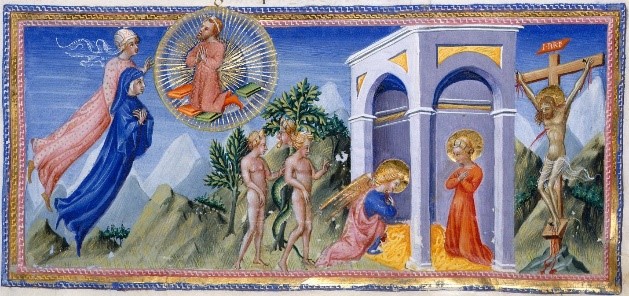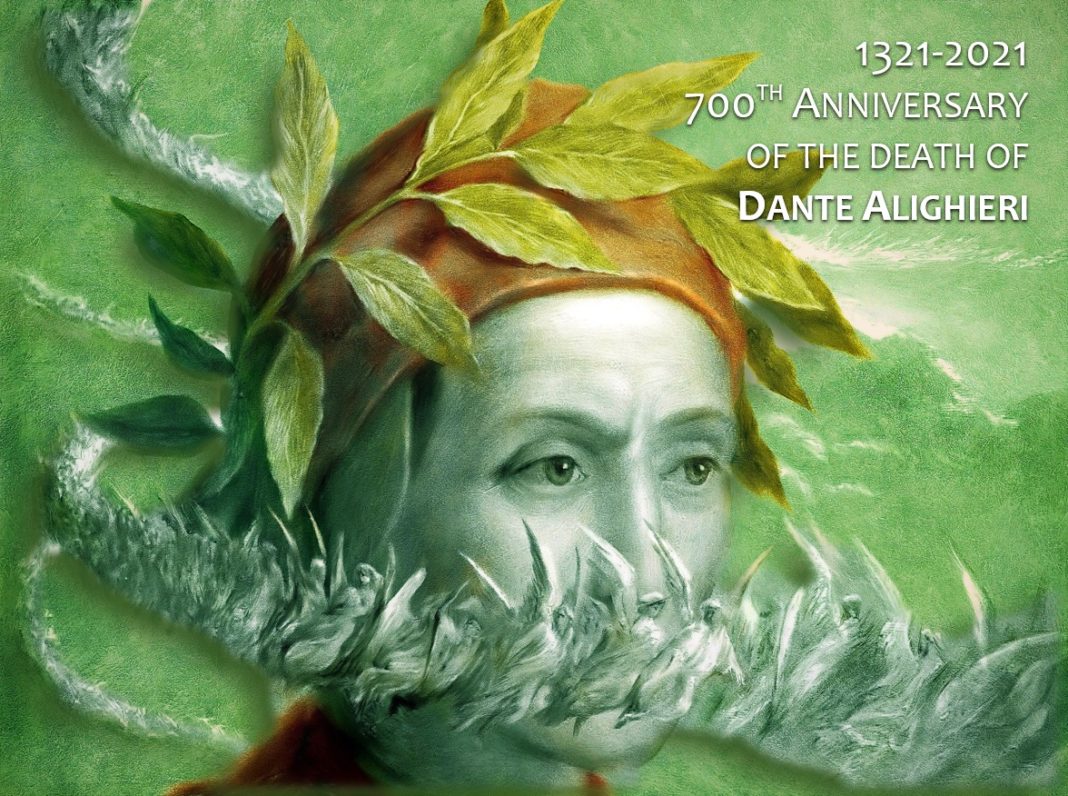In dedicating Paradiso to Cangrande della Scala, Dante calls his last work “the sublime canticle which is adorned with the title of Paradise.” As the author is deeply aware, his definition points to what makes the text unique and lofty, and how it seems to differ from any other literary composition that we know. It also differs from the other two canticles contained in the same poem, canticles which in their own right were already revolutionary in their language and inventiveness. If we want to indicate the trait that makes Paradiso unique, we can find it in the poet’s verse in canto XXIV, taken from the Letter to the Hebrews, which defines faith as: “the substance of the things we hope for.” That is in fact what makes the poetry in Paradiso unique: it is based entirely on things that cannot be seen, things that we can only hope for—through faith.
The theme of this canticle is the bliss of paradise, that is, the perfect fulfillment of man’s infinite desire in his identification with the divine reality. It is something we cannot yet experience, but only hope for; something we may only glimpse, indistinctly, at some brief moment in our earthly life.

A detail of a miniature in folio 141 by Giovanni di Paolo
showing Dante and Beatrice witnessing the mystery of the Redemption
(Source http://www.bl.uk/catalogues/illuminatedmanuscripts/ILLUMIN.ASP?Size=mid&IllID=56951).
Thus we arrive at the absolute novelty of Dante’s canticle, which talks about things that can only be hoped for, or only mystically experienced.
Certainly, the poetic narrative makes this reality impressive by imbuing it with beauty through images of absolute splendor. However, all this—as the poet warns—is just a shadow, the faint memory of a dream that has just vanished or an impression left upon the soul. It is a shadow from which Dante draws all that shall become the matter of his verse (Paradiso I, 10-12). On the other hand, the world he is recalling is not vague; it has a rationally defined order and structure, based on the “similarity” between the human mind and the divine mind that is characteristic of literature.
In this new, third kingdom, Dante consistently renounces any of the tangible representations that he used in the other two kingdoms, such as the landscape and the human figure. He has created a unique story that envisions incorporeal objects, where the only landscape is the sky, and people are just flames. The first two canticles are recounted from historical memory, which chronicles people’s daily events, their vices, virtues and individual activities. Paradiso, on the other hand, also recounts an experience, but it is an interior experience, one we can certainly call mystical, because the text allows us to do so by alluding to the vision of St. Paul, which Dante places in the middle of the first canto (Paradiso I, 73-75). This experience requires a different kind of memory. Historical memory deals with time and space: the mortal pilgrim travels to places on foot. The elements of weight in Inferno and shadow in Purgatorio are signs of his corporeity. The landscapes in both canticles correspond to earthly geography. Finally, the individual stories of the characters are always exactly defined by a place, a time and a deed. All of this is absent from mystical memory. Here, time is not measured; the journey is not described. The passage from one heaven to another is never an act of the body, but only of the gaze, and sometimes occurs unconsciously: And I was with him, but no more aware of the ascent than one can be aware of any sudden thought before it starts (Paradiso X, 34-36).
Here, too, individuals have lost their moral arrogance and domineering behavior. They do not crowd around to tell us about their earthly deeds so that they might be recorded in history. There are few individual private events that are briefly narrated, those of Piccarda, Romeo, and Cunizza, but they remain in the background and only occur in the first three heavens. The other stories have a wider purpose; their function is always public, not private and they have prophetic use, namely, to reproach and exhort against a corrupt world. Thus do we encounter the great figures of Francis and Dominic, as well as Justinian, who is identified with the providential history of the Empire, and Cacciaguida who, years past, had promoted the life of a sober and chaste Florence.
|
|
This happens because Inferno and Purgatorio primarily feature historical man and his past events—while in the background, life takes place in real time. Paradiso primarily features that absolute and eternal reality which is the object of man’s highest desire. It sets him on a path that is not measurable with historical time, towards a reality which, by comparison, makes individual earthly events small and distant.
* The content of this article is taken from: Dante Alighieri: Commedia – con il commento di Anna Maria Chiavacci Leonardi, Bologna, Zanichelli, 2001, La terza cantica pp. IX-XVIII.















